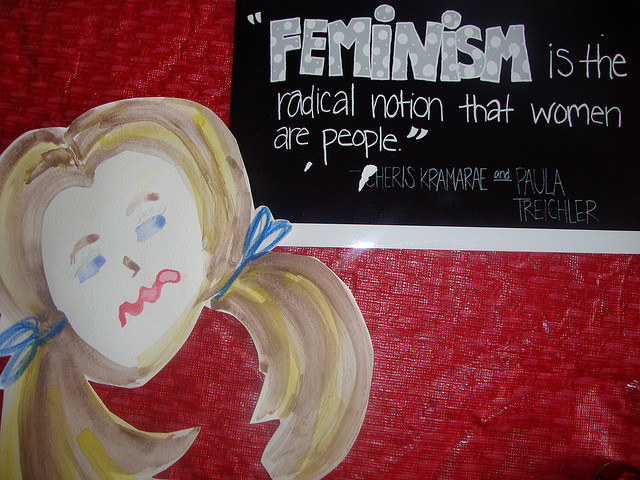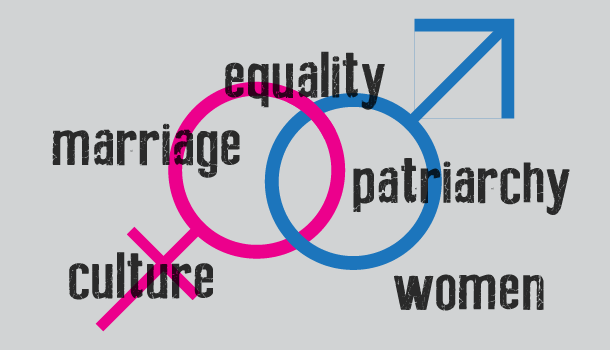
In 2013, I wrote an article for Voices of Africa entitled “African men don’t do feminists.” It was a satirical account of my observations dating African men on and off of the continent. I spoke about how uncompromising these men seemed to be, particularly when speaking about what type of woman they wanted as a partner. From the cooking, cleaning, and child rearing, I spoke to the fact that in many cases, African men would demand that their partners uphold traditional ideals of womanhood, which today can be seen as dated and suffocating to a woman who identifies as a feminist. Now, the definition of feminism is a controversial one, it can be hard to understand and from reading the comments on my article, I realised that African men also don’t really know what feminism is. From talk of “she-males” to “highly educated” women looking to destroy patriarchy, here are a few comments that prove African men still don’t get feminism:
“What we want are women who respect man’s headship in the home and emulate their mothers who respected their husbands, raised their children and built a good generation not the modern day she-male that are out there especially the highly educated ones…”
This guy wants traditional patriarchy to be upheld, and for women in 2015 to emulate our mothers born in the 40s, 50s, and 60s. Feminism is about progress and adaptation, not stagnant gender roles based on what has made many generations of African men most comfortable. A woman who expresses discomfort with pounding yam and popping out babies upon request, is a she-male? A woman pursuing a degree instead of a man is a “highly educated” enemy of progress? A paradigm shift in the psyches of African women does not automatically lead to the emasculation of African men everywhere. Lesson 1: Feminism is not about destroying African tradition, it’s about ensuring that women have a fair chance at a rich and purposeful life, on their own terms.
“I’ve had tons of female feminist friends. Most of the guys who dated them were ugly men and never the tall very handsome (rich or not rich) guys with a nice physique. Never saw one of my feminist friends with a hot man…”
It seems to this gentlemen that only ugly men would be willing to deal with women who identify as feminist. So instead of him viewing feminism as a tool for empowerment, a platform on which women can stand and demand equal pay, respect, and the right to govern their own bodies, feminism is a club of angry women who can only pick up uglies. The fact that this commenter is using a man as THE metric when measuring a woman’s worth tells women to forget your degrees, professional experience, or over all autonomy; a tall, handsome man is the only prize worth vying for. Lesson 2: A feminist is not defined by what she looks like, nor what her partner looks like.
“I am very proud to be an African man who values my tradition and culture and will never drop it for another borrowed or acquired…”
Feminism is NOT a borrowed ideology! It’s important to remember that while American and European white women were burning bras, our mothers and grandmothers were raging against colonialism. They were becoming the first women educated in their respective countries. They were fighting in civil wars, and protecting villages as soldiers ran through to rape and pillage their villages. That is feminism, pioneering in the face of adversity, and creating a space for women to follow. Lesson 3: Feminism is not “borrowed or acquired”, it’s something that is engrained in the matriarchal communities many Africans were raised in.
“But, women and men are not equal as human beings in terms of strength, traits, and talents, plus they look different. New Age feminists have other motives, which sadly catches well-meaning women into their merry band of ideological thinking.”
Women and men are equal as human beings! There are biological factors that make SOME men taller, and SOME men physically stronger than the average woman, but to say we are not the same human beings is preposterous. On that note, feminists are not going around kidnapping your “well-meaning” girlfriends, wives, and daughters and making them join a cult of angry butch lesbians. Feminism speaks to the fact that even though I have a vagina, and breasts, and I carry children inside of me for nine months, does not mean I should be treated any less human than a man. My femininity can be respected and celebrated without it limiting my growth in society. This scary “ideological thinking” this gentleman is discussing, is the radical notion that women deserve the same pay, education, and personal freedoms as men. Lesson 4: Being a woman should not limit anyone in their attempt to be treated equally no matter the situation or environment.
Like I told my boyfriend (I know some of you are surprised, yes, I was able to catch a man in my scary feminist spider’s web), all I ask of him, and of my brothers, my father, and any man in my life, is to give women the space to progress. Let women speak, do not interrupt them, do not dismiss them, listen to what kind of life they want to live, support their choices, and if you don’t, respectfully give them reasons as to why. Giving the women around you the space to express and empower themselves is not just protecting their bodies, but also their agency.
Stephanie A. Kimou was born in Abidjan, Côte d’Ivoire and raised in Washington, DC. She is a blogger by night at A Black Girl in the World and a policy analyst by day. She holds a masters degree in international affairs from Georgetown University in DC, and has studied at the African Gender Institute in Cape Town and the University of Paris in France. Her mother has told her she has two years to get married, or else. Writing is the way she deals with this stress. Connect with her on Twitter: @stephkeems



